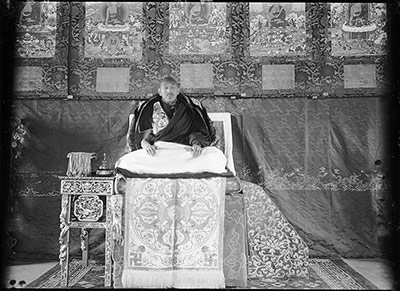
1998.285.91.1 (Glass negative)


1998.285.91.1 (Glass negative)

Sir Charles Bell & Rabden Lepcha
Sir Charles Bell
October 14th 1921
Lhasa > Norbu Lingka > Throne Room
1998.285.91.1
120 x 163 mm
Negative glass plate gelatin , Negative Half Plate
Donated 1983
St Antony's College, Oxford.
Lantern Intensifier
Sir Charles Bell's Mission to Lhasa 1920-21
Royal Central Asiatic Society
Sir Charles Bell with Rabden Lepcha
H.78
BL.H.78
Manual Catalogues - Bell's List of Illustrations entry for H.78: "[No. of chapter] V. [Subject of Chapter] Dalai Lama. [Subject of illustration] H 78 (w) Same as (v), but without hat. Retouched. [Remarks] L.45 [lantern slide]"
Other Information - Related Images: Although the Previous PRM number suggests that this image relates to H.77 in Bell's List of Illustrations, it in fact should be referenced by H.78, currently attributed to solely to 1998.285.91. (v) in the caption refers back to images 1998.285.88, 1998.285.89 & 1998.285.91 (collectively referenced by the caption for H.77). Both 1998.285.87 and 1998.285.91 have been re-touched by highlighting the face. However, 1998.285.91 seems also to have had additional circular abrasive actions applied around the Dalai Lama's head and torso, possibly to soften or lighten the image. Negative glass plate 1998.285.87 seems to have had a thin film or layer applied over the negative, but a shiny rather than matt layer in contrast to 1998.285.86 (H.76). There also appears to be more extensive highlighting to some of the furniture and effects in the room. 'Without hat' in Bell's List of Illustrations caption refers to images referenced by H.77 [1998.285.88, 1998.285.89 & 1998.285.90], in which the Dalai Lama wears a hat. [MS 17/5/2004]
Other Information - Description: Bell's Diary entry for 14th October 1921:"Rabden and I photographed the Dalai Lama this forenoon, sitting on the throne in his throne room, as he would sit when blessing pilgrims. The photos on the whole turned out well. ... This is the throne room that is used on important occasions. // While the room was being arranged the D[alai] L[ama] came in to see that the arrangements were properly made. It was interesting to see him en famille , in his own household. Monk officials, ordinary workmen, went about their work, almost jostling against him, while he wound in and out among them, giving an order here, making a slight change there. Workmen clean and polish the boarded floor by sliding over it boots with large woollen flanges attached, like a ballroom being got ready for a dance." [Diary Vol. XIII, pp. 28-9]
Other Information - Description: Bell describes this occasion in detail “I am to take the Dalai Lama’s photograph again ... the first time that anyone has photographed him in the Holy City (Lhasa)... The arrangement of the throne-room is not ready. I watch them arranging it. The throne is built up of two or three wooden pieces; the nine silk scrolls, representing the Buddha in the earth-pressing attitude, are already placed on the wall behind and above the throne... Below these scrolls red silk brocade covers the wall. The throne is four feet high, a seat without a low balustrade of beautifully carved woodwork running around it. Hanging down in front of the throne is a cloth of rich white silk, handsomely embroidered in gold, with crossed thunderbolts (symbol of equilibrium, immutability and almighty power) ... Chrysanthemums, marigolds and other flowers are arranged round the dais.” ( Portrait of the Dalai Lama .p336)
Contemporary Publication - Published in 'Portrait of the Dalai Lama', Bell, C. A., London: Collins, 1946, facing p.233:"The Dalai Lama on his throne."
Other Information - Historical Background: Bell took many pictures of the thirteenth during the course of their friendship. The first was taken when the Dalai Lama sought refuge in Darjeeling in 1910 [CH 27/03/2003]
For Citation use:
The Tibet Album.
"The Thirteenth Dalai Lama on throne in Norbu Lingka"
05 Dec. 2006. The Pitt Rivers Museum.
<http://tibet.prm.ox.ac.uk/photo_1998.285.91.1.html>.
For more information about photographic usage or to order prints, please visit the The Pitt Rivers Museum.
© The Pitt Rivers Museum